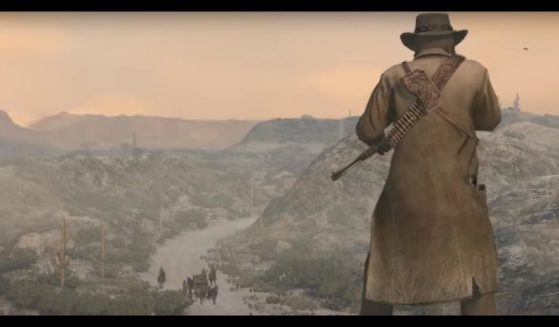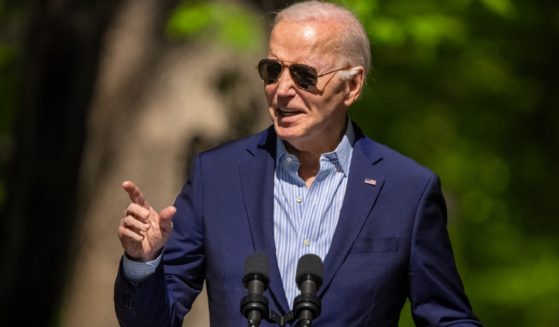Biden Goes Full Carter in Creating Energy 'Crisis' - Reagan Showed How Easy the Fix Is
Seeing President Joe Biden talking about the nation’s gas price “crisis” Thursday was very reminiscent of then-President Jimmy Carter addressing the nation on the same topic back in the 1970s.
Then, as now, the solution was really quite simple and former President Ronald Reagan showed the way: Get off the backs of oil companies and let them produce.
In an Oval Office address to the nation in April 1977, Carter told Americans they would need to learn to conserve more, saying the world’s oil supply was quickly running out.
“With the exception of preventing war, this is the greatest challenge that our country will face during our lifetimes. The energy crisis has not yet overwhelmed us, but it will if we do not act quickly,” he said.
“This difficult effort will be the ‘moral equivalent of war’—except that we will be uniting our efforts to build and not not to destroy,” Carter added.
Carter kept gasoline price controls and regulations on the oil industry in place, which discouraged production.
When Reagan debated Carter during the 1980 presidential race, he said, “Our Government has, in the last year or so, taken out of multiple use millions of acres of public lands that once were – well, they were public lands subject to multiple use – exploration for minerals and so forth. It is believed that probably 70% of the potential oil in the United States is probably hidden in those lands, and no one is allowed to even go and explore to find out if it is there.”
“This is particularly true of the recent efforts to shut down part of Alaska,” he added.
What’s old is new again, but more on that in a moment.
Reagan’s first executive order, issued during his earliest days in office, was ending price controls and removing some regulations from the oil industry.
The New York Times reported at the time, “As a result of the President’s executive order, the cost of gasoline and heating oil is expected to rise.”
“Over the longer term, however, the incentive of free-market prices is expected to at least prevent domestic production from falling, as it did through most of the 1970’s,” the news outlet added.
Prices did not go up as the Times predicted, but rather the exact opposite happened.
The price of a barrel of oil, adjusted for inflation, in January 1981 when Reagan took office was approximately $123 a barrel, and by the time he left in January 1989, it was about $40.
Early last month, oil once against peaked at $123 a barrel, and is currently hovering around $100.
Rather than go the route of deregulation, as Reagan did, Biden announced no changes to his policies Thursday, which have discouraged domestic energy production.
Rather, he said he would be tapping the nation’s Strategic Petroleum Reserve.
The president blamed oil companies for reaping too much profit and Russian President Vladimir Putin for launching a war in Ukraine.
“I say, enough,” Pres. Biden says, calling on U.S. oil companies to produce more amid spiking gas prices.
“This is not the time to sit on record profits. It’s time to step up for the good of your country. For the good of the world.” pic.twitter.com/FAsmUpQaHw
— CBS News (@CBSNews) March 31, 2022
Memo to Biden: The price of oil is set by the world market and is subject to the same forces of supply and demand as every other product.
In the early days of his presidency, Biden signed executive orders under the auspices of addressing climate change, which included suspending oil and gas exploration leasing on federal lands and reinstating an Obama-era carbon dioxide emission federal fee to oil drilling operations that had been lowered significantly under former President Donald Trump.
Additionally, the Biden administration shut down oil exploration in the Arctic National Wildlife Refuge and canceled the Keystone XL pipeline from Canada.
Reuters reported in January that the Department of the Interior said it would be scrapping a Trump administration decision to expand leasing and development in the National Petroleum Reserve in Alaska, which is separate from ANWR.
Biden is holding fast to these policies, even though the U.S. is producing over 1 million barrels of oil a day less than its pre-pandemic high under Trump.
The U.S. Energy Information Administration reported in December 2019, U.S. production topped out at 12.9 million barrels a day, while in January it was 11.4 million barrels.
Last month, Mack Energy Corporation director of government relations Claire Chase told Fox Business Network host Neil Cavuto, “This is a crisis of President Biden’s making. If he had allowed us to continue to drill the way that we were under President Trump, I don’t think we’d be seeing $130 oil today.”
Mack Energy operates oil rigs in West Texas and New Mexico.
Chase accused Biden of misleading Americans by saying there are 9,000 approved federal oil leases going unused.
She pointed out the oil industry has faced the same challenges as others in terms of getting workers and the material they need to do their job, but have the added challenge of federal policies.
“We also need to get the rights of way for our roads to access that lease or for the lines that we need to move the product and that’s controlled by the Interior Department, which has been very slow to get us answers on those rights of way,” Chase said.
“So it’s really sort of a disingenuous figure to say, ‘Well, we’re being very supportive,’ when from day one … the signal to oil and gas companies has been, ‘We don’t want you drilling on federal land.’ And so as a result we are making the choice to invest elsewhere and slow down,” she added.
“If you look at the timeline of those leases, as well, it takes a year to get a permit back from the federal government. So we have to plan a year in advance, and we have two to three years to drill that permit,” Chase said.
Cavuto added that there were close to 40,000 leases last year, which the Biden administration has whittled down to 9,000.
If the president truly wants to end the nation’s energy crisis, reinstitute the policies of Reagan and Trump and the problem will go away.
Truth and Accuracy
We are committed to truth and accuracy in all of our journalism. Read our editorial standards.












